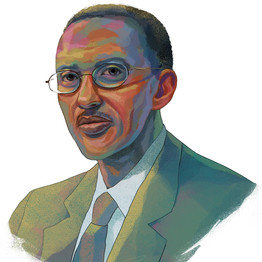Zungu Pule
JF-Expert Member
- Mar 7, 2008
- 2,218
- 1,215
Kisoda,
Ungetutendea haki kama ungetuwekea source (not author alone) na tarehe. Andrew Mwenda ninamfahamu. Ni Editor wa The Independent daily in Uganda. Kwa sasa yuko Yale hosted by the Department of African Studies akiandika kitabu similar to "Dead Aid", denouncing/calling for a radical cut-off, zero foreign aid to Africa. He is not an academic; he is a journalist. Hoja zake hazina evidence, mara nyingi kama si zote. Anatumia story kama hii to conclude that "Aid is not and can never Work". Hapa kuna mambo mawili: (1) how much aid are we talking about? (2) how do you evaluate the impact of development interventions whether funded by foreign aid or taxpayer's money? The second point is the key because if you use flawed method, you will end up with a wrong conclusion. And do we have any piece of empirical evidence to support the argument that foreign aid can never work? Haya ni baadhi ya maswali ambayo wataalamu katika taasisi kama Yale watataka majibu yake kabla ya kukubaliana na hoja ya kupinga foreign aid. In fact, I am not sure if he has given a talk in any econ department!(you know what I am talking about). Je, kuna yeyote aliyewahi kuona paper katika Journal yoyote (peer reviewed) by Andrew or Dambisa or anybody else concluding that aid can never work and it should be stopped because it's responsible for the Africa's economic misery? What about taxpayers money; is it working?
By the way, his dad was a senior minister in Uganda for many years. Arguably, he was a close friend of Kagame (Kumbuka Kagame kakulia Uganda na ndio waliomweka madarakani). Katika mazungumzo yake mara nyingi ana-imply kwamba yeye ni miongoni mwa watu wanaompatia bwana Kagame "policy prescriptions". So, his view of Kagame may be biased!
Ungetutendea haki kama ungetuwekea source (not author alone) na tarehe. Andrew Mwenda ninamfahamu. Ni Editor wa The Independent daily in Uganda. Kwa sasa yuko Yale hosted by the Department of African Studies akiandika kitabu similar to "Dead Aid", denouncing/calling for a radical cut-off, zero foreign aid to Africa. He is not an academic; he is a journalist. Hoja zake hazina evidence, mara nyingi kama si zote. Anatumia story kama hii to conclude that "Aid is not and can never Work". Hapa kuna mambo mawili: (1) how much aid are we talking about? (2) how do you evaluate the impact of development interventions whether funded by foreign aid or taxpayer's money? The second point is the key because if you use flawed method, you will end up with a wrong conclusion. And do we have any piece of empirical evidence to support the argument that foreign aid can never work? Haya ni baadhi ya maswali ambayo wataalamu katika taasisi kama Yale watataka majibu yake kabla ya kukubaliana na hoja ya kupinga foreign aid. In fact, I am not sure if he has given a talk in any econ department!(you know what I am talking about). Je, kuna yeyote aliyewahi kuona paper katika Journal yoyote (peer reviewed) by Andrew or Dambisa or anybody else concluding that aid can never work and it should be stopped because it's responsible for the Africa's economic misery? What about taxpayers money; is it working?
By the way, his dad was a senior minister in Uganda for many years. Arguably, he was a close friend of Kagame (Kumbuka Kagame kakulia Uganda na ndio waliomweka madarakani). Katika mazungumzo yake mara nyingi ana-imply kwamba yeye ni miongoni mwa watu wanaompatia bwana Kagame "policy prescriptions". So, his view of Kagame may be biased!
